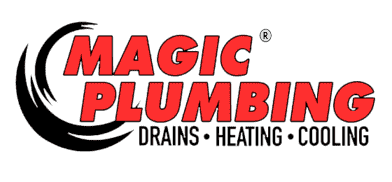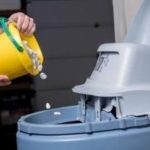
Choosing the Right Type of Water Softener
The dishes are cloudy, and there are streaks on plumbing fixtures. The water dries out hair and skin. A homeowner may have tried streak-free rinse aids, scrubbing the plumbing up and down, but the streaks keep coming back. What's behind all this?
The culprit is likely hard water. Calcium and magnesium naturally occur in a city or well's water supply, but too much causes problems. Hard water can damage plumbing, ruin clothes, streak dishes, and cause dry skin and hair issues. The easy solution to the hard water problem is installing a water softener.
Benefits and Uses of a Water Softener

A water softener does just as its name details: it softens the water. Different types of softeners do this through different methods. But the result of both is cleaner, better tasting, purer water.
Adding a water softener to a home will solve the pesky streak problem and cloudy dishes, but it'll do more than that. Soon enough, hard water can cause major plumbing issues.
Pipe erosion, clogs, and damage to water-using fixtures are a few common hard water issues preventable with a softener. Removing excess minerals in the water also allows the washer to clean clothes better. Showers won't leave skin dry and hair brittle. Cleaning up with water won't leave a residue on surfaces. All in all, the water will stop leaving a trail everywhere it goes.
There are two major water softener options available for consumers: salt-based and salt-free softeners. Continue reading for more information on each option and to find out which might work best.
How Salt-Based Water Softeners Work

As the name implies, this type of water softener uses salt to purify the hard water. A process called "ion exchange" occurs within a resin tank as the tank fills with water. The tank contains salt, which becomes exchanged for the magnesium and calcium in the water through the ion exchange process. When the tank is full, a "cleaning cycle" runs, and the captured minerals are purged from the system before the cycle starts over again. This leaves only the salt and water in the system.
Pros of Salt-Based Water Softeners
- Purifies and removes the excess minerals from water.
- The resulting water is softer and easier on sensitive skin sufferers
- Mineral deposits are removed from the water, thus removing the source of streaks and clouds on surfaces
- Increases the lifespan of water-using fixtures in the home, including the dishwasher, clothes washer, shower, and pipes
- Water bills can reduce thanks to more efficient water-using appliances and cleaner pipes
- Uses a natural, eco-friendly method to remove the excess minerals from the water
Cons of Salt-Based Water Softeners
- Cost more than the salt-free alternatives.
- Need monthly maintenance and refilling of the salt in the resin tank
- Requires an electrical outlet and hookup to work
- Salt can form a "salt bridge" or mush in the resin tank that will stop the cleaning process and will need to removed before continuing
- Salt bridges and mush can come from humidity, so consumers in humid climates must be aware of the risk
Salt-Free Softeners

This type of system is sometimes referred to as a "water conditioner" because it does not strip the excess minerals from the water like its salt-based counterparts. Salt-free softeners instead use a method called Template Assisted Crystallization (TAC) that crystallizes the minerals, preventing them from sticking to any surface. Since the minerals can't stick around, they flush out the home's pipes as the water is used.
Pros of Salt-Free Softeners
- Does not add extra sodium to the home's water
- Cheaper than salt-based softeners
- No need to clean any tanks or maintain reservoirs
- No need for electrical hookup
Cons of Salt-Free Softeners
- Do not actually purify the water of minerals
- Are not as effective against lead or chlorine as salt-based softeners
- To prevent lead and chlorine issues, a filtration system needs to be installed in tandem with the softener
- May not prevent all streaking and clouding in heavily mineralized water
While it may seem complex, the benefits of a water softener can easily outweigh the challenge of finding one for the home.
About Magic Plumbing
Magic Plumbing has been serving the San Francisco Bay area since 1970. They are well known for their cost-effective options and expert staff that always arrive on time with a smile. Fast turnarounds, friendly faces, and top-notch service is guaranteed. Reach out today for more information about whole home water softeners in San Francisco!
Distribution Links +
- wicz.com
- ktvn.com
- fox21delmarva.com
- wboc.com
- tulsacw.com
- rfdtv.com
- wfmj.com
- htv10.tv
- snntv.com
- central.newschannelnebraska.com
- metro.newschannelnebraska.com
- southeast.newschannelnebraska.com
- midplains.newschannelnebraska.com
- northeast.newschannelnebraska.com
- plattevalley.newschannelnebraska.com
- panhandle.newschannelnebraska.com
- rivercountry.newschannelnebraska.com
- wrde.com
- wfxg.com




